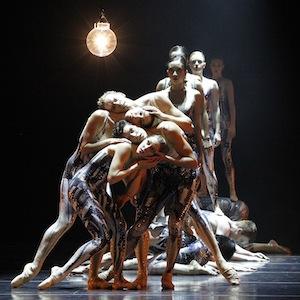So it was as the State Theatre’s rich curtain went up on the first production in the Australian Ballet’s 50th anniversary year: Infinity. The triple bill is touted as: ‘Three choreographic stars. Three rare visions. Three brave new works.’ And in this case, that’s a fair summary.
It’s a brave decision in the first place to kick off the year with a triple bill, as they are not always as immediately attractive as ‘big’ ballets like 2011’s Graeme Murphy production of Romeo and Juliet (which is getting a Brisbane run in March).
But in its 50th year the Australian Ballet is taking a brave and forward-looking approach, having invited three of this country’s internationally acclaimed choreographers to create works that, in the company’s words, herald the bright future of Australian dance.
All this is very well – but audiences still want to be entertained. And they will be. Infinity comprises three works, each of which creates its own world. Some are more easily ‘understood’ than others, but each affirms its place in this program through the way the choreographer’s concept is realised in staging, music and of course, dance.
The unifying force is not so much a linked vision as something more tangible: the strength and beauty of the dancers in our national company. This was a night for ensemble pieces and, although there were fine individual soloists, it was the synchronicity and strong elegance of each group of dancers that was memorable.
First up was The Narrative of Nothing, choreographed by Graeme Murphy with long-time creative associate Janet Vernon. Costume design was by Jennifer Irwin, stage and lighting design Damien Cooper and sound design Bob Scott, with the score, Fire Music, by Brett Dean.
All these contributions were intrinsic to the work and allowed a constant focus on the dancers, who delighted with their combination of athleticism and grace. In this way the ballet was similar to the final work – Stephen Page’s Waramuk – in the dark night, with Bangarra Dance Theatre.
Music for this latter work was by David Page, orchestrated by Jessica Wells, costume design by Jennifer Irwin, set design by Jacob Nash, lighting design Padraig O Suilleabhain, and sound design by Bob Scott – featuring Dhuwa and Yirritja songs and stories from North East Arnhem Land, with vocals by Jamie Wanambi, Banula Marika and Janet Guypunguna Munyarryun.
Page’s ballet was immediately captivating and seamlessly traced the passage of one night in a desert landscape, from evening star to morning star. I had assumed that Page’s ballet would lead the trilogy – but after seeing it, understood that its completeness was the right choice to conclude the performance.
With such intensity in the first and third works, Gideon Obarzanek’s ballet served as comic relief – which is not to belittle the choreographer’s intent. Obarzanek says that he was interested in differing versions of perhaps the most famous ballet, Swan Lake, especially as true love seemed to be at the heart of all of them.
So his There’s Definitely a Prince Involved sets out to examine the idea of love – from a modern perspective. It was a shock to not only hear dancers speak, but see them clutching a hand mic – particularly as the Prince, the White Swan and others cheekily questioned the significance of ballet-style romance.
In fact, the comments were so entertaining and thought-provoking that it was a pity some were drowned out by the orchestra.
Some references to traditional ballet were inspired, as when those on stage ‘watched’ the dance of the Little Swans (as signalled by Tchaikovsky’s famous music) much as a tennis crowd indicates the state of play by the movement of their heads.
It was all great fun; oddly, by seeming to send up conventions of romantic ballet, Obarzanek in fact affirmed their worth. And, as through the entire program, the dancing was not compromised: always sure in the timing, always eminently watchable.
Conductor Nicolette Fraillon drew a sympathetic performance from Orchestra Victoria; in Sydney the dancers will be accompanied by the Australian Opera and Ballet Orchestra.
Rating: Four and a half stars out of 5
The Australian Ballet presents
Infinity
The Narrative of Nothing (2012)
Choreography by Graeme Murphy
Music by Brett Dean
There’s Definitely a Prince Involved (2012)
Choreography by Gideon Obarzanek
Music by Stefan Gregory after Piotr Tchaikovsky
Warumuk − in the dark night (2012)
with Bangarra Dance Theatre
Choreography by Stephen Page
Music by David Page
State Theatre, Arts Centre Victoria
February 24 – March 6
Opera Theatre, Sydney Opera House
April 5 – 25





